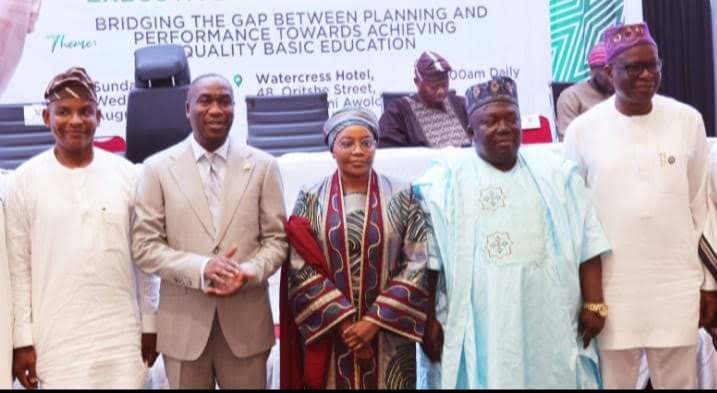UBEC Reaffirms Commitment to Bridging Planning–Performance Gap in Basic Education

UBEC Reaffirms Commitment to Bridging Planning–Performance Gap in Basic Education
The Universal Basic Education Commission (UBEC) has reiterated its resolve to close the gap between planning and performance in Nigeria’s basic education sector.
Executive Secretary of UBEC, Aisha Garba, made this known during the 27th quarterly meeting of UBEC Management with State Universal Basic Education Boards (SUBEBs) held in Ikeja on Monday. The meeting was themed “Bridging the gap between planning and performance towards achieving quality basic education.”
Garba noted that while reforms and repositioning efforts have recorded significant progress, they remain only “initial steps towards delivering greater impact in Nigeria’s basic education system.”
She highlighted several milestones, including the revision of UBEC’s matching grant formula to promote equity, accountability, and data-driven allocation of resources across states. According to her, “27 states have accessed part of ₦121 billion backlog of matching grants in 2024, representing a 65 per cent improvement.”
The Executive Secretary also announced the revamp of the two-decade-old Basic Education Action Plan (BEAP), which she described as a blueprint to “promote needs-based planning and accelerate programme implementation across states.”
Other notable achievements include the construction of 4,900 classrooms, renovation of 3,000, and supply of 354,000 pieces of furniture in 2025, directly impacting over 2.3 million learners. She further unveiled Nigeria’s largest teacher development programme, backed by a ₦22 billion investment in capacity building, aimed at improving teaching standards and learning outcomes nationwide.
Additionally, UBEC has digitised its quality assurance system, training over 500 officers in real-time electronic monitoring to enhance supervision and evaluation of schools.
Despite these strides, Garba emphasised that challenges remain. She stressed that Nigeria’s problem is not weak policy but poor execution, often resulting from “weak institutions, inconsistent funding, and ineffective programme tracking.”
“This disconnect informed the theme of this meeting,” she said. “Only through consistency and joint commitment can every Nigerian child have access to education and receive the quality learning they truly deserve.”
In his remarks, Dean of SUBEB Chairmen, Prof. Shehu Adaramaja, underscored the importance of data-driven planning, digital tools, and evidence-based decision-making. He called for regular learner assessments and provision of classrooms, libraries, technology, and modern learning materials to strengthen the education delivery system.
The meeting concluded with renewed pledges from UBEC and SUBEBs to align strategies, deepen accountability, and collectively work towards quality education for every Nigerian child.






